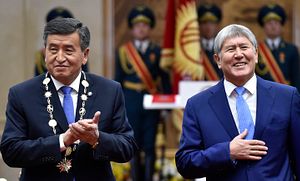Kyrgyzstan’s Supreme Court has reportedly ruled that the immunity enjoyed by former presidents is unconstitutional. According to RFE/RL, on October 3 the court’s Constitutional Chamber ordered the government to pursue amendments to the legislation that outlines presidential activities, responsibilities and to-date has included immunity from prosecution
Back in early June, the court accepted a petition to evaluate the constitutionality of presidential immunity. At the time, lawyer Nurbek Toktakunov wrote on Facebook that “the absolute inviolability of the ex-president in accordance with the Law On Guarantees of the President’s Activities contradicts the constitutional principle of equality of all before the law.” Parliament this past spring was discussing a bill to remove presidential immunity but the initiative stalled over the summer recess.
The idea of stripping past presidents of their protection against prosecution isn’t a sudden development, though the court’s ruling moves the idea closer to fruition. Although in theory, Kyrgyz ex-presidents have enjoyed immunity, in practice this hasn’t been the case,
After fleeing Kyrgyzstan following the revolutions that ousted them in 2005 and 2010, for example, Askar Akayev and Kurmanbek Bakiyev were stripped of their ex-presidential immunity. This paved the the way for convictions and sentencing in absentia on various charges including murder, corruption and abuse of office.
Of Kyrgyzstan’s four presidents since independence, only two actually enjoy immunity at present: Roza Otunbayeva and Almazbek Atambayev.
Beyond the general constitutionality argument — that all, including former presidents are equal before the law — Atambayev is the target of this drive to set aside ex-presidential immunity.
As reported earlier this week, KyrTAG and Eurasianet, an Onuguu-Progress member of parliament, Ishak Masaliyev, reportedly said he’d formally begun the process for a legal amendment on changing the immunity rule and that he had Atambayev in mind.
Some of Atambayev’s allies have found themselves facing charges in the year since Sooronbay Jeenbekov, himself once an Atambayev ally, was elected president. Others have been shuffled out of office. Most notably, former Prime Minister Sapar Isakov has been charged with corruption related to a 2013 $386 million loan from China’s Eximbank. The loan, issued in the open days of what we now call the Belt and Road Initiative (BRI), was for the purposes of modernizing the Bishkek Power Plant. The plant broke down at a critical, and very cold, moment in January this year, kicking off a hunt for who to blame, which morphed into a reckoning on how Kyrgyz politicians dealt with their Chinese partners.
































